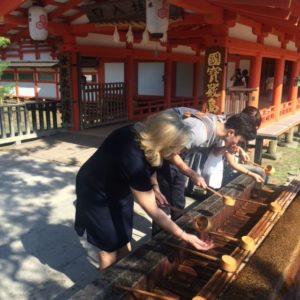Japan’s Obon (or Bon) Festival, also known as the Festival of Souls or Lantern Festival, begins August 13 and ends on August 16, 2021. This annual Buddhist three-day festival has been celebrated for over 500 years in Japan and is dedicated to honoring ancestors as families reunite, and spirits visit household altars.
Obon Origins
The origin begins with a disciple of Buddha, Mokuren (Maha Maudgalyayana), who used his powers to peer into the position of his deceased mother. Morkuren discovered that her spirit was trapped in the Realm of Hungry Ghosts. Apprehensive of his mother’s plight, he turned to Buddha in hopes that he could free her. Buddha advised his disciple to give offerings to the sangha (monks) who had returned from their summer retreat. Through his actions, his mother was released from suffering to arise as a Buddha. Morkuren then danced and created the tradition of Bon Odori.
The Festivities
On the first day of Obon, Lanterns are hung near graves, temples, and homes as a welcome to light the way for the spirits to return. It is believed that the ancestors’ spirits return to this earthly world to visit their relatives. The celebration’s highlight is called Bon Odori, which involves parades of traditional dancing around platforms called a yagura. Other traditions are dependent on the Japanese region, such as Kyoto’s fire festival, where 600-foot-high bonfires are built on the mountainside in the evening. Finally, on the last day of Obon, bonfires, candles, and lanterns are released to guide the departing souls farewell back to their world.
Modern Civilization and its Impact
Obon has been celebrated for over 500 years. However, in contrast to Japanese deep spiritual roots, current Obon festivals are evolving. As civilization advances and historical practices are discontinued, the underlying meaning of Obon is revealed. Despite the perceived compromise, fundamental values such as harmony, family, and gratitude, remain. As innovation supersedes tradition, Japanese youth seek a balance between sacred traditions and new cultural values. However, new methods do keep traditions alive through family practices. Obon celebrates the interconnection between nature and souls, whether living or dead, that supersedes daily life. Participants are encouraged to disregard current struggles and instead honor their elders. Ancestors are the founders of current life, we must remember that because of them, we exist.
Bon Odori Festivals
If you find yourself in Japan during these wonderful events, immerse yourself in their culture by attending a grand Bon Odori. For example, visit Kyoto for the fire festival, Tokushima city for the greatest preserved dance (Awe Odori from 1578), Nagasaki for the spirit boat festival, Gujo for the largest Odori dance party, or Mikasa for an intimate locals festival. Bon Odori, Obon is an unforgettable spectacle of solidarity that has lasted throughout the ages. For more history, read Obon: Celebrate, Respect, and Remember Ancestors.
Sharon Schweitzer, J.D., is a diversity and inclusion consultant, cross-cultural trainer, etiquette expert, and the founder of Access to Culture. In addition to her accreditation in intercultural management from the HOFSTEDE Centre, she is an attorney and mediator. Her Amazon #1 Best Selling book in International Business, Access to Asia, won a coveted Kirkus Star, and was named to Kirkus Reviews’ Best Books. She is a winner of numerous awards, including the British Airways International Trade Award at the Greater Austin Business Awards.
#Lanternfestival, #Obonfestival, #ObonCelebration, #Bonfestival, #BonOdori, #Boncelebration, #Bonfestival, #gratitudeforelders, #respectofelders, #respectforelders, #Japanesefestival, #Kyoto, #Japaneselanternfestival, #NationalJapaneseholidays, #Japanesecelebrations, #Japanesegifts, #ancientjapan, #ancientJapanesetraditions, #ancienttraditions, #bonfires, #light festival, #SharonSchweitzer, #interculturalcommunication, #crossculturaltrainer, #AccesstoCulture, #AccesstoAsia, #texasetiquetteexpert, #modernmanners, #businessetiquette, #etiquette



Leave A Comment